#go 2 speculation
Explore tagged Tumblr posts
Text

I think we can all agree on this one.
#michael sheen#good omens#aziraphale#ineffable husbands#good ineffable omens#david tennant#crowley#good ineffable husbands#the white curl#sheendex#you need therapy#welsh seduction machine#soft scottish hipster gigolo#neil gaiman#Neil Gaiman deserted us#crowley good omens#good omens 2#good omens spoilers#go 2 speculation#i need therapy#aziracrow#with a little crowley thrown in the mix#the angst is real
7K notes
·
View notes
Text
Have a gold star...
I swear, I started this as a wholesome innocent comment on how when Crowley has to think of a prize, after 6000+ years, his sweet head still goes to stars as the ultimate symbol of something beautiful and cherished.

But then I was struck by something: sarcasm.
Both times, when he tells someone to "have a gold star," he doesn't say it with a tone of affectionate irony, like the cool-but-sweet uncle with a rough personality but a soft heart. He says it with a tone of bitter sarcasm, of painful disenchantment.
Because it's not a prize that he is offering; it's a sop, a cruel joke-gift, something that will get you excited at first just because you have a stupid, naive, innocent soul, and you will later realize that it means nothing to the one who assigned it to you, and that they are ready to take it away whenever they want, while the rest of the world laughs at your ridiculous gullibility.
Because this is what stars were for him.
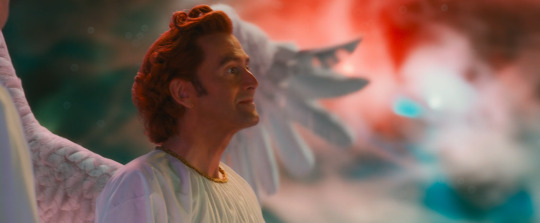
They were his beloved, exciting creation. The star-factory nebula was his cherished task, assigned to him by God, and he believed that it was meant to be a thing of beauty and splendor, and hold value in the grand scheme of the universe... only to discover, immediately after he created it, that it was never intended to have any value at all. It meant nothing to God. It wasn't even planned to last enough to fullfill its purpose. It was a joke, a cruel prank.
The stars were God's bad pun of giving angel!Crowley something to do, and love, and have hope and expectations for, and then taking it away. Revealing that it was just a shiny piece of gold cardstock that only a simpleton could consider valuable. Of course he can only say "have a gold star" as a dry snarky sarcastic comment on someone who thinks they have achieved something meaningful when it's actually nothing. Be it the Them defeating the Four Horsemen. Be it Muriel being noticed by the Metatron.
Great, sure, have a gold star, be all excited and squealing with happiness, it will turn into ashes before you even know it.
I am not sure that Crowley's snake eyes were ever intended to signal that he cannot see the stars because snakes have bad vision (even ignoring the zoological fact that they are sensitive to UV light though, so they should still see astronomical objects, in the book it says that demons must be able to see at night, and that's why Crowley doesn't need to turn on the lights on the Bentley), but for sure the Fall and Heaven's cruelty has ruined the stars for him, in a way.
Now, in his mind, they are the ultimate symbol of delusion, of naivety, of foolishly investing your love and passion and hopes in something, of stupidly ignoring that the things you cherish will be ruined or taken away from you or leave you on their own accord.
That's also why Aziraphale's "nothing lasts forever" cuts him so deep. That's why his "no... no, I dont' suppose it does" sounds so much like a truth that he is remembering instead of one that he has jsut discovered.
Here you go, you did it again, you thought you had something significant and instead it was just like your stars, you should have known that whenever you find something beautiful it's just a matter of time before you lose it, you shouldn't get too attached.
In s1e6 he says it to the Them, in s2e6 he says it to Muriel. I do hope that in s3e6 he will get the chance to say it again, but this time it will be honest and out of joy, because whatever is going to happen will make him able again to believe that you can be happy, and can hold onto the good things that you love. You can have all the gold stars, for real. They don't always have to disappear and leave you in pain. They can stay with you.
#he's still the starmaker deep down#have a gold star#good omens#good omens 2#go2#crowley#aziraphale#good omens thoughts#go2 spoilers#go 2 speculation#good omens 2 spoilers
2K notes
·
View notes
Text
I went dumpster diving into the posters for Good Omens Season 2 and found a few pearls.
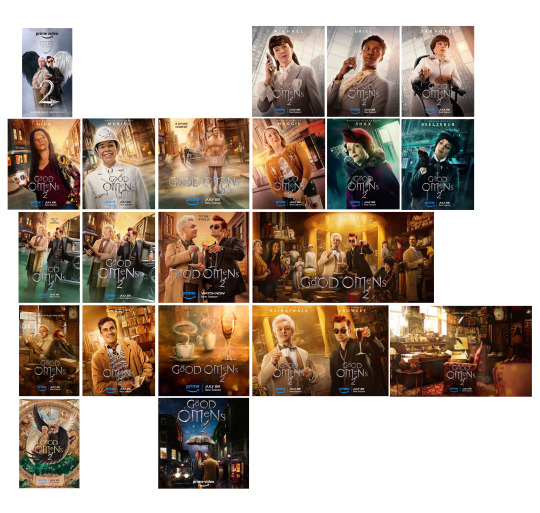
I found it odd that this season had SO MANY official posters. Hours and hours of work and real dollars from Amazon went into the production of these things. This one won a freakin Clio award. I know Neil confirmed he didn't have a lot of control of what went into these 21 (Or 22 depending on whether or not you count the umbrella piece that was made before season 2 shooting began. Personally I don't!) pieces, but I will leave no stone unturned, so here we go. I combed through every single season 2 poster I could find so you don't have to. Here's everything I've found so far:
1. The allegiances poster

After having watched season 2, knowing what we know now, this poster seems very much to me like a Game of Thrones style family at war image. We have a perfect mirror down the center, with Aziraphale/Angels/Nina&Maggie on Aziraphale's traditional left side, and Crowley with Beelzebub & Jim as reflections of Maggie/Nina, and Shax and Michael(?) as reflections of the three angels on the other side of the mirror. It seems unbalanced, unless you count the floating white head (conveniently watching in the background) as The Metatron...
Which means Michael is... not on the same side as Uriel and Saraqael? She's also grouped in with the Metatron and Shax, on the side of the demons. How very odd. Gabriel & Nina also have a mirror in that they've both turned their backs to the crowd. Gabriel is willing to go live with Beelzebub in hell, and shut down Michael's plan and the Metatron's scheming for a second Armageddon, so that literal turn towards Beez and away from everyone else makes sense to me. The Nina one however? Not so much from what we've seen. Why is she turning her back on the angels & demons? 2. The individual posters
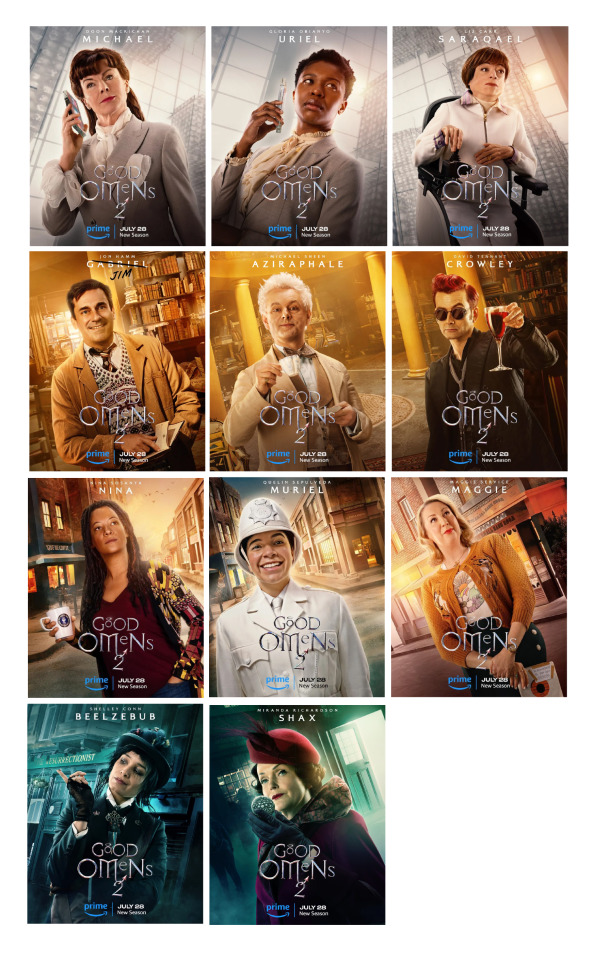
Interestingly, the individual posters all line up pretty much exactly with the all the allegiances this season. You just have to look at the way the characters are slanted vs. how the backgrounds behind them are slanted. All 3 bookshop posters and all 3 street posters are slanting left, with their characters also slanting left. They are who they say they are, and they're on the same side.
Michael and Uriel have right slanting backgrounds, so odds are heaven is supposed to slant right. Uriel is following the rules and slanting right, but of all the characters on the posters, Michael is the only one really betraying the background slant, and is slanting left against her background. Something's up with Micahel. They're not on the same side as they claim to be. Saraqael is more mysterious, as the only one sitting straight, and the only angel to have a left slanting background. Shax seems to be slanting left with a left slanting background, which puts her in the same pose as Uriel, but mirrored. While Beelzebub is weirdly slanting right with a right slanting background, making them a bit of a traitor, like Michael. Shax, Saraqael and Michael have some explaining to do. Lastly, and I think mostly obviously, there's clearly a missing poster in the set. Why doesn't hell have a third green poster? Is it supposed to be the Metatron, and they didn't want to spoil the surprise? Furfur maybe? Why wouldn't poor old Furfur get a poster when he has more screen time than Uriel? I don't think this is very important other than it's funny : everyone single person is holding something in their right hand, except for Shax and Crowley, who are holding things in their left hands, and Muriel, who's holding fucking NOTHING. Poor baby Muriel lolsob. One thing I do think might be important is that there are 21 posters in total + 1 missing one. So maybe 22 posters for season 2? How appropriate. 3. The triple phone box
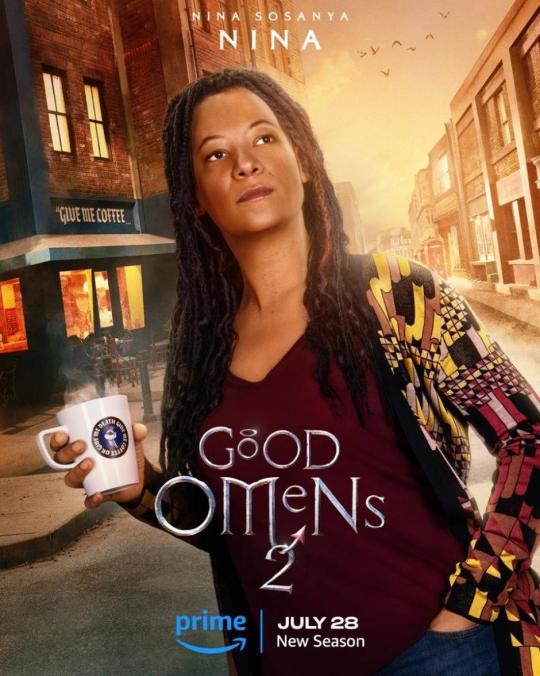
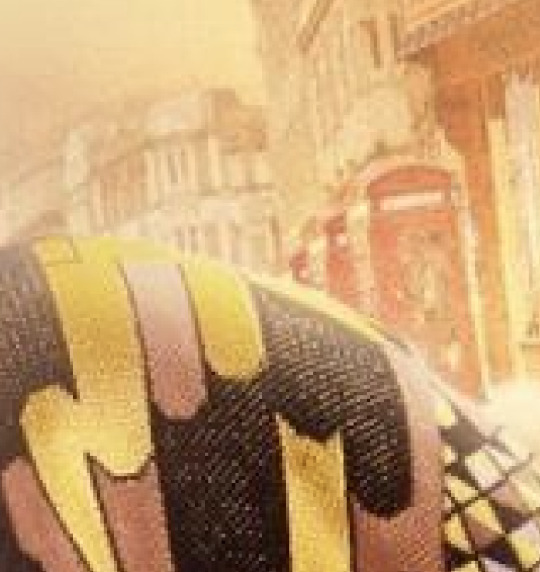

In both the Nina street poster and the group street poster, there's are a set of 3 red phone boxes down the street. We never see phone boxes in series 2. Seriously, not once. Every other detail in these ones is from Whickeber street footage: gumball machine, post box, newspapers, coffee sign, puddle, walking extras... The only thing out of place is those blasted phone boxes. As far as I can tell it's literally the only thing in all 21 posters that never appears in the show in some form, and this background plate is used for all the street posters, so the phone boxes are in quite a few of them.
4. Crowley is showing his good side, Aziraphale is always facing away from Crowley.



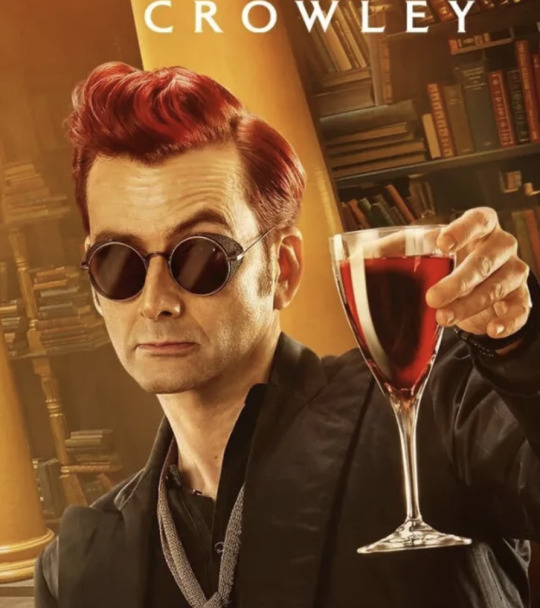
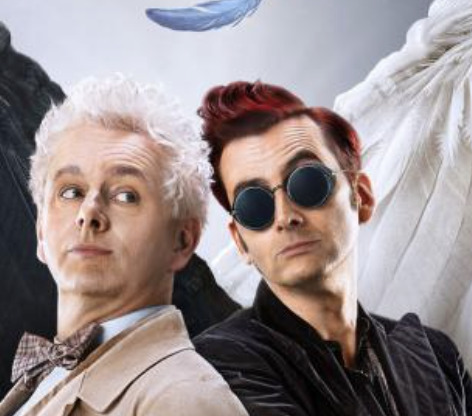
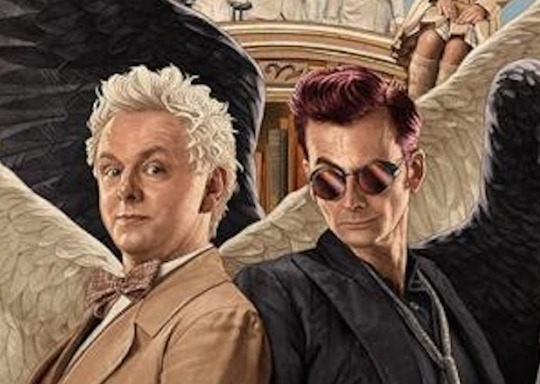
Crowley is always shown with his head tilted to his right this season, body tilted towards Aziraphale and always with long sideburns. Even in the illustrated poster his default is head to the right, sideburns long.
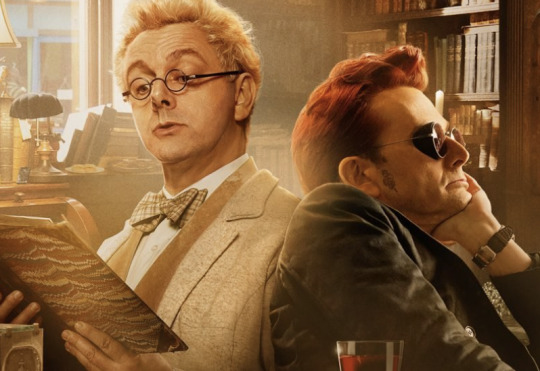
EXCEPT for this poster. This is the only time he's looking away from Aziraphale, and his snake tattoo is visible. And his sideburns are short. Either nobody noticed this or they refused to fix it. There's also the matter of Aziraphale facing his body away from Crowley in every single image except the allegiances poster, where they face each other. So cute.
5. The sneaky details posters
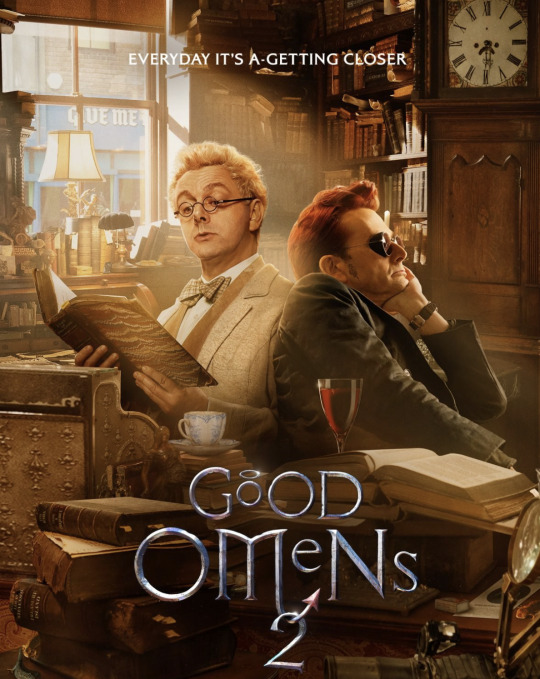
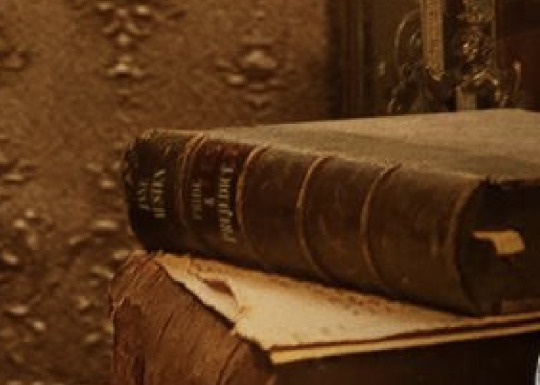




This one has: 1. Pride & Prejudice 2. Treasure Island 3. A tale of two cities 4. The Crow Road 5. Catch-22 9.

AND whatever the hell this photoshop artifact/invisible thing coming out of the scroll on Aziraphale's desk. I checked every version I could find of this poster and it's always there. It looks like someone tried to edit out something that was there and sort of got it mostly right. Which is completely ludicrous given the amazing amount of flawless photoshopping and collaging going on in this image. These are the magicians linking rings from the 1941 magic shop. Mystery solved!
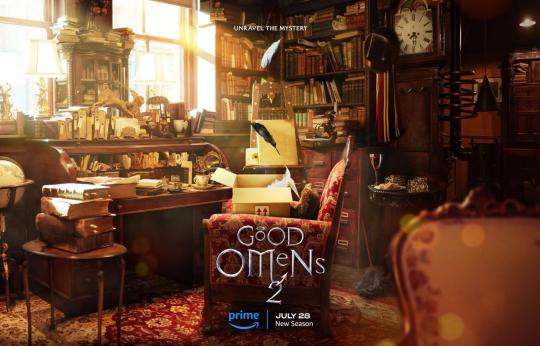
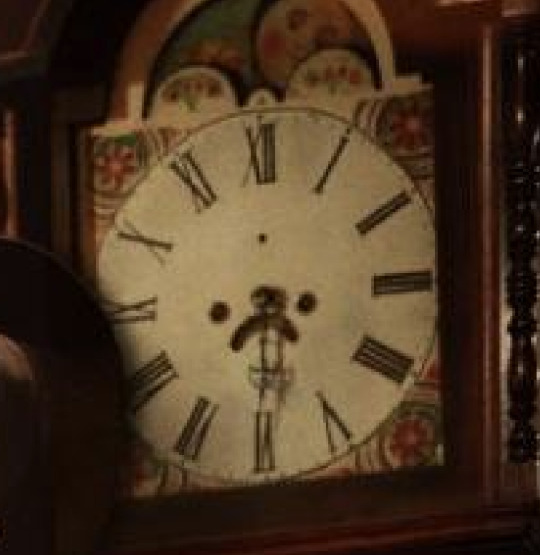
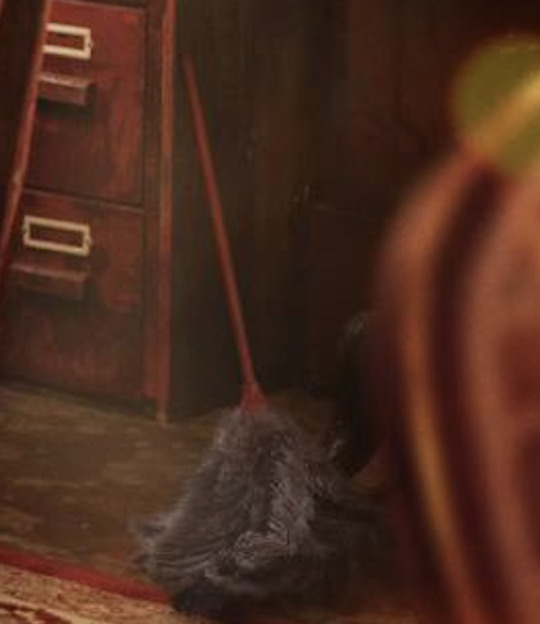

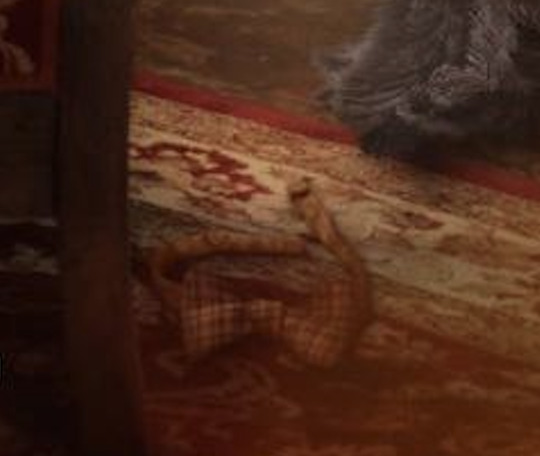
This one has the yellow book on the bookstand, the record, and : 1. Only one clock hand on the grandfather clock, facing 6. 2. A feather duster on the floor (but weirdly it's grey not yellow). 3. The dark horse statue with Crowley's old sunglasses on it. 4. Aziraphale's bowtie ON THE FLOOR. What. Why. I can only conclude that in this poster either A) Aziraphale and Crowley have left these things behind (meaning no more bowtie for Aziraphale in season 3) B) They are currently not wearing these items somewhere else in the bookshop....
_____________________________________ I ran out of images. So the dome poster will have to be it's own post!
#good omens meta#good omens 2#good omens season two#art director talks good omens#go season 2#go meta#good omens season 2#go2#go2 spoilers#go 2 speculation#aziraphale x crowley#ineffible husbands#good omens s2
1K notes
·
View notes
Text
Aziraphale's expression here really stuck with me - and I think it may be because it is the moment Aziraphale realizes they aren't having one of their normal arguments.
I actually don't think he understands throughout Crowley's confession - he never fully responds or acknowledges anything Crowley says.
Crowley was prepped for this conversation, Aziraphale wasn't. He isn't picking up the signs.
I think about how Crowley really didn't see where Nina and Maggie were trying to take the conversation. Crowley honestly had no idea where they were going.
I think THIS is when it hits Aziraphale there is more happening here..
It's the first time his expression matches Crowley's.


And when Crowley says we could have been "us" Aziraphale turns away as he starts to get overwhelmed. It's all happening very fast, and it's just too much.
He's suddenly in a conversation he didn't see coming.
I don't know that Aziraphale has ever looked away from Crowley like this before?
I'm theorizing it's because he's overwhelmed. He's hurt. He's confused, and maybe scared?
His mask is completely gone. He's completely vulnerable.
He's covering with anger already.

But he's not allowed to retreat. Crowley isn't going to let him get off that easily.
In the same instant that it's beginning, it's somehow ending.
The kiss completely breaks him.
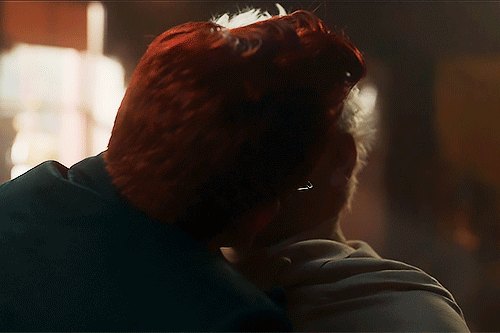
There's no misunderstanding at this point.
But it's too much.
It's Too Fast.
You go too fast for me, Crowley
Crowley always could pivot faster than Aziraphale. Add on the pressure of some prat (Metatron) watching through the window, and this being the FIRST time they've had such a real moment - I can see where it was just too much.
He has two choices.
Break. Or redirect his emotions to anger.
He chooses to steel himself up against a rising wave of sorrow.
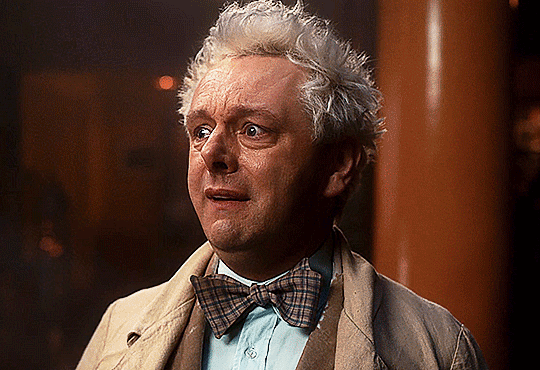
This also means - had Aziraphale understood what Crowley was saying in real-time they could have come to a better resolution. They could have come together.
#good omens 2#ineffable divorce#good omens#good omens crowley#david tennant#michael sheen#anthony j crowley#aziraphale#good omens season 2#ineffable husbands#good omens spoilers#go 2x06#go 2 spoilers#go 2 speculation#go spoilers#go s2#go season 2#good omens season two#crowley
2K notes
·
View notes
Text
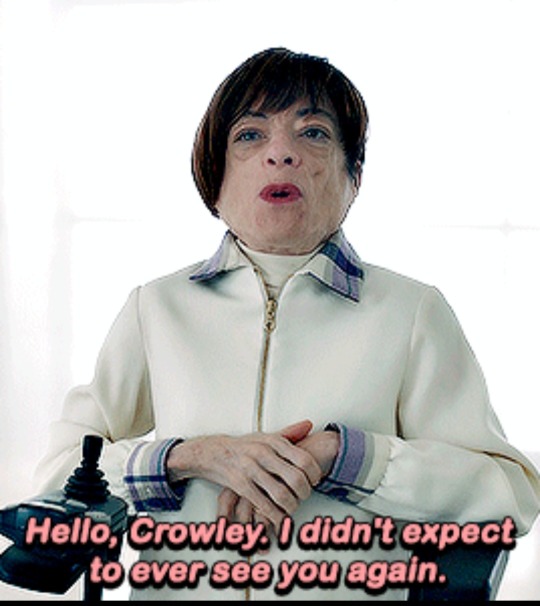
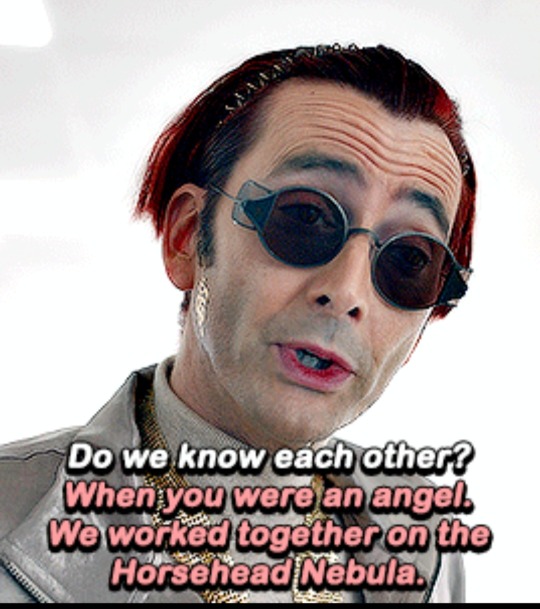
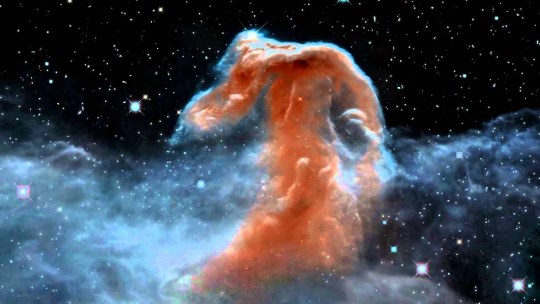
I think that Saraqael is one to watch. She recognized the purple energy burst, she could at least sense Goob/Jim when he fanned the Terry Pratchett book in her face. And wasn't a jerk boss to Muriel like the other Archangels.
But. Very importantly. She recognized Crowley in Heaven in his (atrocious) angel disguise, wasn't accusatory, and USED HIS CHOSEN NAME. Didn't deadname him, remembering their work on the Horsehead Nebula (pictured). And she, and Muriel, have elements of PURPLE in their clothing. I think she could be an ally to Aziraphale and/or see him if Metatron tries to conceal him (theoretically, obviously me speculating).
Also: as a wheelchair user, I WHOOPED when she made her OWN RAMP into the bookshop.🥰
#good omens#good omens aziraphale#good omens crowley#neil gaiman#@neil himself#ineffable husbands#good omens series 2#good omens season 2#go2 spoilers#go 2 speculation#angel crowley#good omens angels#starmaker
2K notes
·
View notes
Text
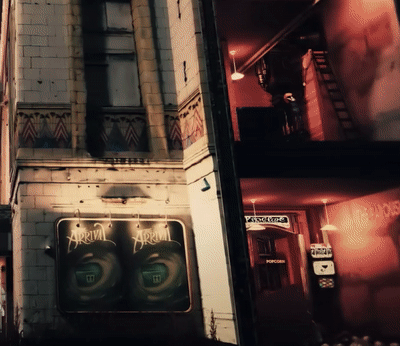
Has anyone else noticed Crowley and Aziraphale continuously kissing on the theatre box yet?
#please god let this be a hint at season 3#vavoom my heart#do it again#ineffable divorce#no nightingales#good omens#aziracrow#innefable husbands#crowley#aziraphale#crowly x aziraphale#good omens 2#go2#go2e6#go2 spoilers#good omens s2#aziraphale and crowley#go 2 speculation#good omens season two#good omens s3#good omens season 3#good omens spoilers
508 notes
·
View notes
Text
I don’t think Crowley will end up working “with” Hell in a high ranking position in 3 or at all. The main reason is because he already did that in the first season. He worked as a high ranking demon in the process of Armageddon, because Hell was planning most of it. In 3, Heaven is supposed to be planning the most of it so Aziraphale will have to take the higher ranking part. It’s Aziraphale’s turn
#good omens#good omens 2#crowley#aziraphale#ineffable husbands#good omens spoilers#go2#good omens speculation#david tennant#go 2 speculation#michael sheen#good omens meta#but it’s just sort of a theory#this isn’t about what he would choose#this is about the set up#bxh
333 notes
·
View notes
Text
This⬆️I knew it!

#aziraphale#crowley#good omens#michael sheen#neil gaiman#art#fanart#go2#go2 spoilers#good omens fanart#good omens 2#go 2 speculation#david tennant#dark duke#aziraphale good omens#azircrow#crowley fanart#crowley x aziraphale#crowley good omens#aziraphale x crowley
765 notes
·
View notes
Text
The Kiss, the Apple, the Tree: Illumination and Temptation in Good Omens ⸻⸻⸻⸻⸻⸻⸻⸻
The kiss in Good Omens 2 between Aziraphale and Crowley is the emotional and symbolic climax of the series—a gesture that transcends romance to embody a profound theological and narrative tension. It is not merely an act of love, but a moment charged with symbolic, almost biblical weight. Laden with layered meaning, the kiss evokes not only the betrayal of Judas but also the possibility of redemption through love and vulnerability.
At the heart of the finale, this gesture resounds like thunder in the emotional silence of Aziraphale. In that instant, many viewers saw more than a confession of feeling: they saw the Apple from the Tree of Knowledge being offered once again. Crowley, like the serpent in Genesis, presents what is forbidden but enlightening. He is a Luciferian figure—not in the sense of evil, but as a conscious rebel against a rigid celestial order that demands blind obedience. In doing so, he offers Aziraphale not just affection, but awareness.
This interpretation has taken shape through countless posts, analyses, and reflections on social media. And the more one considers it, the more it seems inevitable: Crowley gave Aziraphale knowledge. And Aziraphale tasted that truth.
The kiss becomes an act of rupture—challenging both heavenly and hellish conventions, and affirming the freedom to choose humanity over divine institutions. Its ambiguity—passion, pain, sacrifice—mirrors the central conflict between duty and desire, rendering it the most powerful and transformative gesture of the series.
Now, I want to share my own analysis, especially because it’s been a while since I’ve created a post like this, and I’ve really missed it. I adore diving into deep subjects, and studying theology and connecting it with TV series is something that truly excites me. There’s something so captivating about exploring how these grand, timeless ideas play out in such modern contexts, and Good Omens is an incredible example of that fusion.

The Return of the Apple: Genesis and Revelation
In the book of Genesis, chapters 2 and 3, the biblical narrative tells that God forbids Adam and Eve from eating the fruit of the Tree of the Knowledge of Good and Evil, warning them: "In the day that you eat of it, you shall surely die" (Genesis 2:17). But the serpent, a symbolic figure of cunning and temptation, deceives Eve, promising her that they will not die, but that by eating the fruit, they will become like God, "knowing good and evil" (Genesis 3:5). The promise of divinity and awareness is irresistible. Eve, yielding to temptation, eats the fruit, and then offers it to Adam, and "the eyes of both of them were opened" (Genesis 3:7). The apple, though never explicitly mentioned in the biblical text, becomes the universal symbol of transgression and knowledge. In Latin, "malus" means both "apple" and "evil," creating a wordplay that links the fruit to the concept of sin and forbidden knowledge.
The fruit does not bring immediate death, but awareness, the ability to discern between good and evil. Eve and Adam lose their innocence but gain a new form of understanding. The apple thus becomes a symbol of rebellion, but also of revelation, a decision that pushes humanity out of innocence into the darkness of awareness. "The eyes of both of them were opened" (Genesis 3:7), but this opening is never without pain. The truth they discover is harsh and complex, and their choice marks the separation between what was and what will be.
In the finale of Good Omens 2, the act of Crowley, once an angel, picks up the same symbolism. When he kisses Aziraphale, the gesture is not just a declaration of love but an offering of knowledge, much like the apple was in the Garden of Eden. Crowley does not tempt Aziraphale to disobey, as the serpent did with Eve; rather, he invites him to see the world with new eyes, to recognize that truth is never absolute, but made up of nuances. When their lips meet, Aziraphale receives the awareness that Eve and Adam had acquired in the garden: a vision of the world that is not black or white, but a constant negotiation between good and evil, between right and wrong. The apple, therefore, becomes the symbol of a new understanding, of a conscious choice that leads to revelation.
The apple, in this sense, is not just a forbidden fruit but a symbol of evolution. It is the key to understanding morality, not as a rigid and immutable concept, but as a fluid, interconnected, and nuanced reality. Just as Eve and Adam, the moment they eat the fruit, cannot go back, so Crowley and Aziraphale, embracing this awareness, are no longer the same. The apple represents the passage from simplicity to the darkness of knowledge, a knowledge that changes, that is never simple but always complex and full of meanings, just like morality itself, which never divides clearly between good and evil. "You will not surely die... you will be like God" (Genesis 3:5) – the truth is that once knowledge is acquired, we can no longer ignore it. And like Eve, like Crowley, like Aziraphale, we are condemned to live with our eyes open to reality, with all the weight and beauty that it entails.

Aziraphale as Eve: The Enlightenment of an Angel
In the Gospel of Matthew (16:26), we read: "What good will it be for someone to gain the whole world, yet forfeit their soul?" It is a question that strikes at the very heart of the human conflict: the cost of loyalty, truth, and compromise. Aziraphale, always faithful to Heaven, is an angel who has lived for millennia adhering to the celestial order with devotion and discipline. His identity has been forged in a clear distinction between good and evil, within a universe structured according to divine design. Yet Crowley’s kiss — as human as it is cosmic — breaks the seal of his innocence. It is not merely an act of love, but an inner apocalypse, a revelation that shatters the Manichaean dichotomy in which he has lived. Just as Eve, tasting the fruit of the forbidden tree, came to see the world with different eyes, Aziraphale in that moment is pushed beyond the boundary of blind faith.
"Then the eyes of both of them were opened" (Genesis 3:7) is the verse that describes Adam and Eve’s awakening, but it could just as well describe the angel’s state of mind after that gesture. He is no longer the pure and obedient messenger he believed himself to be; he has become a witness to a world too complex to be framed in rigid categories. Grace and fall coexist, and wings — even white ones — get dirty in the attempt to act in the real world. Heaven is no longer the pristine place he once revered, just as Hell is not merely a receptacle of evil. The celestial institutions have become structures, and structures — as even St. Paul says — can become corrupt: “The letter kills, but the Spirit gives life” (2 Corinthians 3:6). Aziraphale has understood that, no matter how much Heaven claims to stand for good, it can also become its blind executor.
And yet, despite this revelation, Aziraphale chooses to go. His loyalty is no longer that of the obedient angel, but of the prophet. Like Moses, who ascends the mountain knowing he will never enter the Promised Land, Aziraphale steps into the celestial chariot with a new awareness: he has seen, he has understood, and yet he chooses to remain within the system — perhaps to change it, perhaps to save what can still be saved. Like Eve, he can no longer pretend not to know. His choice is no longer based on ignorance, but on hope and will. It is the weight of freedom — the same freedom God gave humanity the moment He allowed the tree of knowledge to grow in the middle of the garden.
The Bible is filled with figures who, like Aziraphale, are forced to choose between truth and loyalty. Peter, who denies Christ out of fear, then weeps bitterly (Luke 22:62); Job, who suffers under an incomprehensible divine justice but never stops questioning God; Jonah, who flees his mission rather than accept God’s mercy toward his enemies. Aziraphale does not run. His choice is a return — not to blind obedience, but to a more mature, more painful faith. As St. Paul writes, “When I was a child, I spoke like a child... but when I became a man, I put away childish things” (1 Corinthians 13:11). Aziraphale is no longer a childlike angel: he has become a conscious being, one who has chosen to face the celestial powers with open eyes, even if it means parting from the one he loves.
Crowley has shown him the world, and Aziraphale has chosen not to look away. Like Eve, he has eaten the fruit, and like every being who knows, he now bears the weight of that choice. The act of leaving is not a betrayal, but a silent martyrdom. It is the awareness that Heaven and Hell, as they are, are not enough. And that perhaps only those who have loved, suffered, and seen with human eyes — like Christ on the cross, who cried out, “My God, why have you forsaken me?” (Matthew 27:46) — can truly understand what good means. Aziraphale has stopped believing out of obedience. Now, he believes by choice.

Why Aziraphale Will Return — And in Disguise
It is in the Gospel of John (14:6) that we find one of the most radical and luminous affirmations of the Christian faith: “I am the way, the truth, and the life. No one comes to the Father except through me.” These words, spoken by Jesus, are not merely a theological declaration, but an existential calling: knowing the truth is not enough — one must walk its path. Truth is something to be discovered, yes, but also something to be lived, embodied, and suffered. In the instant Aziraphale receives Crowley’s kiss — his apple, his personal apocalypse — he sees the truth. He sees what Heaven refused to show him: that good and evil are not simple categories, but tensions, wounds, compromises — acts of love and doubt interwoven.
That truth transforms him. He is no longer the angel who watched the world from above, dispensing miracles and justice as if they were mathematical equations. He is an angel who has tasted human fragility, who now carries the weight of awareness on his shoulders. “You will know the truth, and the truth will set you free” (John 8:32) — but freedom often comes at the price of solitude. Aziraphale is now free, but he has lost the shelter of certainty. And for this very reason, he must find the way.
His return to Earth will be inevitable, because truth cannot remain disembodied. Just as the Word “became flesh and dwelt among us” (John 1:14), Aziraphale too must become part of the world again — return among humans, where good and evil blur, where love is never simple and choices are always ambiguous. But he will not return as he once was. He will return in disguise, perhaps playing the role of the angel he has always been, like Christ who, “though being in the form of God, did not regard equality with God as something to be grasped, but emptied himself, taking the form of a servant” (Philippians 2:6-7). Pretending not to know will not be a lie, but strategy, compassion, a test. It will be his way of discovering whether Crowley is still willing to wait, to fight beside him, to hope. He does not yet fully trust his own heart — and yet, he can no longer ignore it.
In Aziraphale, the inner struggle between obedience and love has taken a new shape: no longer a dichotomy, but a living tension, like that of Jacob wrestling with God through the night and receiving the name Israel — “he who wrestles with God and prevails” (Genesis 32:28). Aziraphale too has wrestled with God — or rather, with his idea of God — and though his faith is wounded, it is more authentic. His vulnerability is no longer a weakness, but a strength: “My power is made perfect in weakness” (2 Corinthians 12:9). With this new awareness, Aziraphale prepares to reenter the world — not as a judge, but as a bridge. Not as a messenger of certainties, but as a seeker of the way.
And Crowley? He chose the truth long ago. He gave up Heaven rather than lie to himself. Now it is Aziraphale’s turn to walk toward him — not to deny what was, but to build something new. Perhaps the kingdom of Heaven is not above, but in the space between two hands reaching for each other. And the way — the way Christ pointed to — is never linear. It is made of uncertain steps, of returns, of silences. But it is there, in that tension between fear and love, between wound and longing, that Aziraphale will find his renewed mission. Not as a mere angel of Heaven, but as a conscious, awakened being — capable of loving with all his mind, all his heart, and all his soul (Matthew 22:37), just as was asked from the very beginning.

"We Made a Decision" — The Tree, the Mug, the Carved Heart
A seemingly simple, almost marginal detail takes on profound meaning for those who look closely: a commemorative mug created at the end of filming Good Omens 3. On its glazed surface, an image: a majestic tree, its roots stretching like veins through the earth, and carved into the trunk, two hearts. Inside each, two letters: AZ and CR. Beneath it, a weighty, cryptic phrase: “We made a decision.”
The scene it evokes is silent, yet eloquent. The tree is not just any tree. It is the Tree of the Knowledge of Good and Evil, the one that stood at the center of the Garden of Eden, according to the Genesis account. It is beneath that very tree that, in Season One, Crowley and Aziraphale meet for the first time, witnesses to humanity’s expulsion — observers of a rebellion that, in some way, will mark them forever. It is there that Aziraphale offers Crowley an umbrella. It is there that their bond begins — not in Heaven, not in Hell, but in the midst of the Fall.
“But the serpent said to the woman, ‘You will not surely die. For God knows that when you eat of it your eyes will be opened, and you will be like God, knowing good and evil.’” (Genesis 3:4–5)
Everything begins under that tree: knowledge, free will, the capacity to choose. And for them too, that scene marks the beginning of a transformation. They are no longer merely an angel and a demon. They are two conscious beings — who think, feel, and choose.
The mug, then, is not just a collectible item. It is a narrative symbol, almost a liturgical artifact of the story. The initials carved into the hearts — AZ for Aziraphale, CR for Crowley — recall that deeply human, ancient, almost adolescent gesture of etching one’s names into a tree to seal a bond hoped to be eternal. And yet here, the act carries sacred weight. It is not just love — it is covenant. It is a declaration of intent, as one might make in a ritual, or upon an altar.
“Two are better than one, because they have a good reward for their labor. For if they fall, one will lift up the other. But woe to the one who is alone when they fall and has no one to lift them up.” (Ecclesiastes 4:9–10)
The phrase etched beneath the tree — “We made a decision” — is neither random nor neutral. It is performative. This is not a decision — it is the decision. The kind that alters everything, that breaks the cycle, that leaves no easy way back.
But what is this decision?
Perhaps it is the decision to remain in the world — to belong no longer to Heaven or Hell, but only to each other. Perhaps it is the decision to stop hiding what they feel. Perhaps it is the decision to part ways, for a greater good. Or perhaps, it is the choice to fight side by side against the forces that would see them torn apart.
Like Adam and Eve, Crowley and Aziraphale have been cast out of a safe place — but they are not lost. On the contrary, they have chosen. And in that choice lies their true divinity.
“You did not choose me, but I chose you and appointed you so that you might go and bear fruit.” (John 15:16)
The mug, then, is not mere merchandise — it is a gift to the tropes. A small domestic altar to the story that thousands of viewers have lived and interpreted. It is also a promise — that something has been decided, that everything is ready, and that when we see them again, nothing will be the same.
So then... what is the decision?

The Second Coming and the End
In the biblical context, the Second Coming is one of the most emblematic events in Christian prophecy — a triumphant return of Christ that marks the end of time, the final judgment, and the beginning of a new era. It is the moment when the world will face salvation or damnation, but more importantly, the moment when everything that has been hidden will emerge into the light. The Second Coming, as described in the Gospels, will be an act of power, but also of separation: “When the Son of Man comes in his glory, and all the angels with him, he will sit on his glorious throne, and all the nations will be gathered before him...” (Matthew 25:31-32). Humanity, in the face of the final judgment, will have to reckon with its actions.
However, in the context of Good Omens 3, the Second Coming takes on a meaning that transcends the traditional conception. It is no longer an event that signifies the end of the world, but rather a moment when the forces of Heaven and Hell clash once again, seeking to drive the world towards a new apocalypse. The threat of the Second Coming is not just the return of a deity, but the escalation of a battle between opposing forces that has characterized the entire history of the world.
But at the heart of it all are two beings who have chosen to stand neither on one side nor the other: Crowley and Aziraphale. They are neither angels nor demons, but something different — a middle ground. Just like Eve and Adam, who ate the fruit from the Tree of Knowledge, Crowley and Aziraphale have made a choice that makes them free, but at the same time vulnerable. The apple is no longer a symbol of the fall, but of awareness. Like Adam and Eve, they too have gained new knowledge — a consciousness that separates them from their creators but also makes them free to decide. And that freedom is both a gift and a curse.
“Then the Lord God said to the woman, ‘What is this you have done?’ And the woman said, ‘The serpent deceived me, and I ate.’” (Genesis 3:13). But in this case, the serpent is no longer just a deceiver, but also a liberator. Crowley, who in traditional biblical readings might be seen as the tempter, reveals himself to be the embodiment of freedom, the act of choosing — just as the serpent did with Eve. Aziraphale, on the other hand, though an angel, does not simply follow divine will, but chooses to ally himself with Crowley, choosing love and freedom over blind obedience. And through this bond, a new alliance is born — one that does not belong to the divine order or the infernal one.
In a sense, Good Omens 3 reaches a crucial point: the end of the cycle of cosmic wars and the birth of a new reality. Crowley and Aziraphale will not only save the world once again, but they will do something more radical: they will save humanity from its dependence on a universal order that forces it to choose between good and evil. They themselves are the result of a rebellion that has created a new form of consciousness, one that goes beyond the duality of heaven and hell, right and wrong.
Take, for example, the final scene of the first season, when Adam, the little Antichrist, eats the apple — a symbolic act that echoes Eve’s gesture in the Garden of Eden. Adam chooses his freedom, much like Crowley and Aziraphale have done throughout the centuries. The difference, however, is that Adam is not condemned by his act, but liberated. “You will be like God, knowing good and evil,” as the serpent tells Eve. In Adam’s case, his choice does not bring destruction but a new possibility. Freedom, in this case, is not the cause of the fall, but the means for rebirth. And in the same way, Crowley and Aziraphale have chosen to protect the world from a predestined end, choosing not only to love each other, but also to choose the future — the one that is not already written in any sacred book, the one that must still be written by human freedom.
And so, their journey will come to an end. Good Omens 3 will mark the conclusion of a story that has spanned centuries, millennia, but is now heading toward its closure. It will not be an ending that appeals to the final judgment, but a conclusion that transcends the very concept of judgment. Crowley and Aziraphale, after saving the world yet again, will make a definitive choice: not only to no longer be mere pawns in a cosmic war but to become the creators of a new reality, one that does not rely on the divisions of good and evil, but that is based on freedom, love, and awareness.
“For God so loved the world that he gave his one and only Son, that whoever believes in him shall not perish but have eternal life.” (John 3:16). In their case, the "Son" might be humanity itself, which has the opportunity to live not under a predetermined fate, but under the sign of a new awareness — the one Crowley and Aziraphale have forged in the fire of rebellion, love, and choice.
Their conclusion, then, is not an ending of the "final judgment" kind, but a true rebirth, where, finally, humanity will have its fate in its own hands. And for them, this will be the end. They will no longer save the world. This is their farewell to the cosmic struggle. Their journey is over. From now on, the world will be in the hands of humankind.

Conclusion: The Choice of Freedom and the End of a Cycle
In conclusion, Good Omens is much more than a supernatural comedy. It is a parable about love, free will, and the awareness that arises from rebellion. It’s not just about angels and demons, but about two beings who, choosing not to belong to either side, show us how every choice has weight and how love can become the only true force for change.
Good Omens 3 will not just be the end of a cycle, but the beginning of a new creation, or perhaps a new destruction. The fate of humanity, free from divine or infernal determinism, will be in the hands of those who know how to choose. The end of the war between good and evil will not mark defeat, but the end of one chapter to give birth to an entirely new one.
The words of Michael Sheen, who promised that the finale will satisfy the fans, give us hope. It will not just be a closure, but a conclusion that will leave us with new questions. Will Crowley and Aziraphale manage to build a world where there are no more wars? Will the freedom they have chosen lead them to rebirth or to final destruction?
The freedom to choose is the true power they possess, and this finale invites us to reflect on how each of us has the power to write our own story, even in a world that seems already decided. Hope and change are what we can expect, because, in the end, even if the Apocalypse seems to be approaching, maybe it’s never too late to start writing a new chapter.
#good omens#good omens 2#analyses#theory#crowly x aziraphale#crowley#good omens spoiler#aziracrow#aziraphale#good omens theory#good omens crowley#azicrow#evil#good and bad#good and evil#crowley x aziraphale#ineffable husbands#inefabble husbands#inefable#lucifer#lucifer morningstar#ineffable idiots#good omemes#go season 2#go 2 speculation#go2 theory#good omens cast#go2#good omens spoilers#go2 spoilers
25 notes
·
View notes
Text
I genuinely don’t know if I’m the only one that noticed this but there is a scene where Muriel says that only “high ranking “angels can open the dossier about Gabriel’s trial and CROWLEY OPENS IT. Am I going crazy or did this actually happen.
#good omemes#good omens#go2#go2 spoilers#go 2 speculation#crowley#good omens 2#david tennant#michael sheen
453 notes
·
View notes
Text
Crowley was originally the angel Kokabiel and here's why:
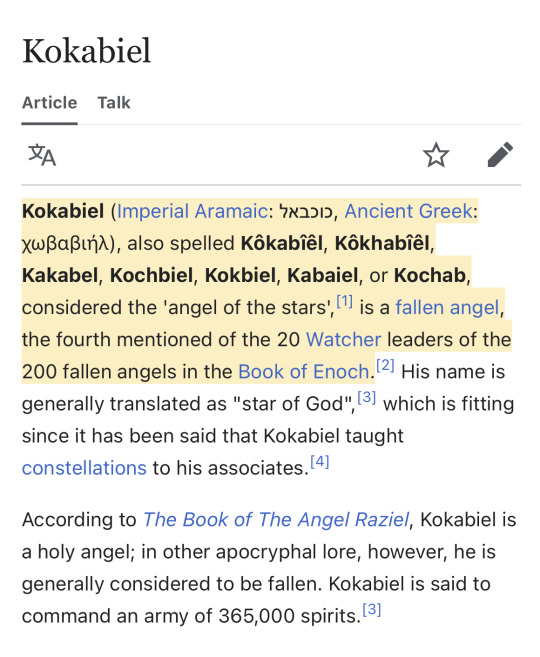
Just looking at this definition of Kokabiel, we know two things: 1.) that they were the angel in charge of the stars, and 2.) the ended up falling. This screams Crowley, as in the first episode of season two we are shown Crowley in his angel form literally creating the stars. He also has a map of the stars in his hand, including all the constellations.
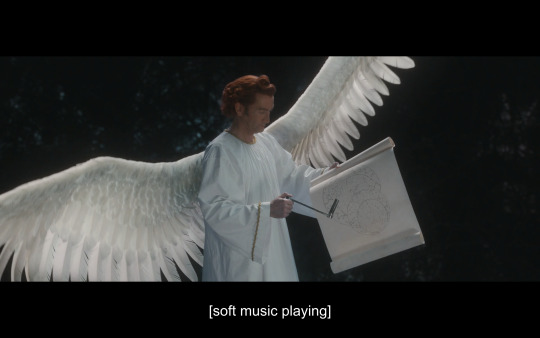

When the galaxy comes alive, Crowley is ecstatic! But when Aziraphale asks if he had done it all himself, he says "Ah, well, I mean, more or less. I wasn't... I wasn't, um... I wasn't the original concept designer, but I worked very closely with the upstairs on it," The "upstairs" in question being God.
Continuing on this theory, Crowley then explains that what he's created is a "star factory" and then launches into teaching Aziraphale about the creation of stars and constellations--much like Kokabeil was known for.
Once Crowley is let on that the "upstairs" is going to shut everything down in about 6,000 years, Crowley is mostly upset that his stars would die. He doesn't know earth by it's name, as he would most likely never have concerned himself with anything other than stars, and when he's told that his stars are only there for humans to just look at, he gets upset and ultimately starts questioning God--a slippery slope after all, because how much trouble can you get in for asking a few questions?
Well, a lot, apparently. Crowley becomes a fallen angel, like Kokabiel, and as we see towards the finale, he still has enough power to open up Gabriel's classified documents--something only a very powerful angel could do. This would align with Crowley being Kokabiel, since Kokabiel was the angel behind creating the universe and all it's stary components.
Not to mention that Crowley has dropped hints about his true name throughout the show, constantly bringing up that they could runaway together to somewhere in the universe both heaven and hell can't find them, or to alpha centuari--a star system in the universe. This hints that Crowley knows places in the universe that others do not (since he created it), and his desire to run away into the stars is just setting up reveal it is because they are of his own creation as an angel.
#good omens#good omens 2 spoilers#go2 spoilers#go 2 speculation#ineffable husbands#good omens season 2#go2#crowley#good omens season two#gos2 spoilers#aziracrow
404 notes
·
View notes
Text


Not okay with the part of the intro where Crowley and Aziraphale are on top of a roof, overlooking a mound of records, while hearts fall around them.
#good omens#good omens 2 analysis#good omens analysis#good omens 2#neil gaiman#good omens s2#good omens season 2#go2#go 2 speculation
476 notes
·
View notes
Text
Evidently I like to keep breaking my own heart, but you know, I don't think Crowley was about to say:
"And I would like to spent the rest of my life with you."
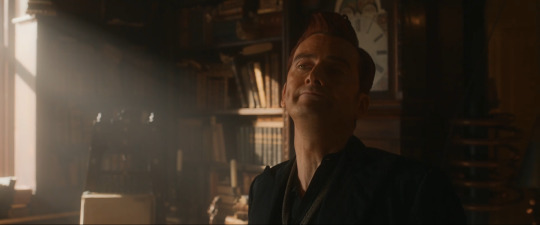
If you skip the "I mean, the last few years not really" parenthesis, I believe his full confession/proposal was going to be:
"We're a team, a group. Group of the two of us. And we've spent our existence pretending that we arent. [...] And I would like to spend it not pretending anymore."
And that's because he had prepared his little speach before Aziraphale came back, he had rehearsed it in his mind, taking their togetherness for granted. They had always been together, they had already spent their lives together and they were surely going to spend them together anyway forever.
Being together was not the point, because not being together was simply unthinkable. The point was stop pretending and finally become "an us" - openly, honestly, fully. The possibility of being separated never crossed his mind, it would not make sense for him to ask Aziraphale to be together, it would imply the existence of a reality in which they are not.
So when he pushed through and decided to say what he was going to say, he got to that part and the realization started to creep in that he might actually have been too much of an optimist. The possibility of them not being together did exist, it was coming into existence in that very moment, in front of his eyes, making the "stop pretending" part suddenly incongruous. And all the rest of his speach fell apart.
Now the point was "are you going away?", "what about us if you go?", "what is happening?", "why is this happening?", "how can this be happening?". Now the important thing that needed to be said was "let's be together, if you don't feel like stop pretending because it's dangerous then we can run off somewhere, far from Heaven and Hell and their threats, but just please let's stick together."
That's, I think, why he chocked on his words.
He was ready to take a little step forward, and he found himself falling a thousand steps backwards.
#good omens 2#go2#crowley#good omens thoughts#aziraphale#good omens#go 2 speculation#go2 spoilers#good omens 2 spoilers#coping with grief
2K notes
·
View notes
Text
Beelzebub's thrones
So I haven't seen anyone talking about this at all, but maybe I'm just missing posts. You can see Gabriel's & Beelzebub's plan all along was to get him kicked out of heaven and come rule hell by nope'ing Armageddon-again in the first episode!
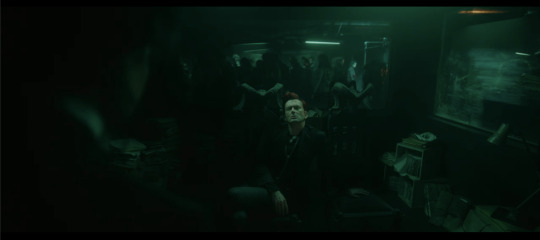
How? It's right there when Beez calls Crowley down to chat very agitatedly in S2E1 about finding Gabriel for "us". They have actually dragged two thrones (out of the S1 judgement scene no less) into their office(?) and staged them side by side, as equals. They are sitting in one already, waiting for the second to be filled any minute by their missing fallen angel! Only they get Crowley instead. It gets even cuter/sadder when you see the same office again in S2E3 when they ask for updates on Gabriel, and this is how the thrones are looking now.


They've been slowly losing hope over Gabriel's smooth descent to hell, so they're just trying not to think about it, and have thus shoved the chair in a corner under some paperwork, trying really hard not to think about him, but still RIGHT IN FRONT, FACING THEIR THRONE. Clearly not working so well then. And then in S2E4, when they are at their lowest point, Beez has moved to a completely DIFFERENT room with only one throne, and it's all alone in a spotlight. They can't even stand being in the ROOM with both thrones anymore, it hurts too much. It's just then when Shax makes their move, and offers to bring them in by any means necessary, including absolutely f%$?ing all politics and going to war over a book store. And they say YES. Poor Beelzebub. (As an extra art direction piece of genius in this scene you can see one lone soul in a similar spotlight staring up at - earth, maybe? - looking like how beelzebub feels on the inside. T_T)

#neil gaiman#good omens s2#good omens 2#good omens season two#go2#go 2 speculation#good omens meta#good omens#beelzebub#jimbriel#ineffable bureaucracy#neil gaiman I see what you did there and I love it#go meta#demon crowley#art director talks good omens
558 notes
·
View notes
Text
Angels can't rely on other angels in heaven. Demons can't rely on other demons in hell. What they have is SO RARE. Saying they could always rely on each other is no small thing. There are no other places where this is true for either of them. It's actually EVERYthing.

#good omens#good omens 2#good omens crowley#david tennant#good omens season two#anthony j crowley#michael sheen#aziraphale#crowley#neil gaiman#good omens spoilers#good omens season 2#good omens s2#good omens series 2#go 2 spoilers#go 2 speculation#go 2x06#good omens spoiler#good omens 2 spoilers#go spoilers
409 notes
·
View notes
Text
Something was "bothering" me about Aziraphale's bookshop in the new season: it felt bigger on the inside even if the proportions were the same (compared to the first season).
So, obviously, I have looked for some photos from both seasons (mainly from Neil's bookshop tour for S1 and trailers or promotional videos for S2).

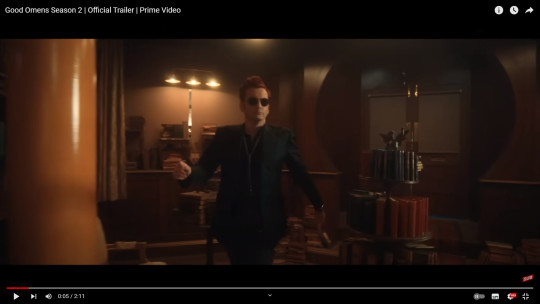
It's not bigger: it's less crowded.

There are less books haphazardly laying around and they're more organized.
There are no longer book piles on the floor everywhere.
And the same is for some bookshelves.

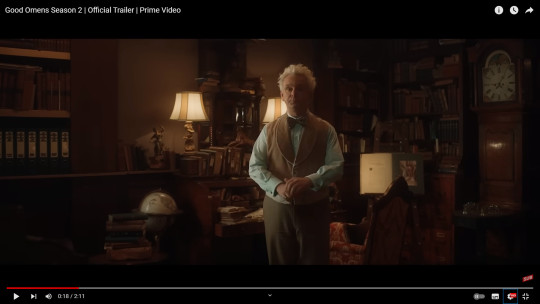
I dunno what are those "folders" on the left.
Only Aziraphale's desk is still cluttered.
I don't know why there is this difference but I have 2 main theories:
1) Crowley is stress cleaning everything and Aziraphale is letting him do that because he knows it helps his dear friend demon.
2) Aziraphale is reorganising his belongings to give Crowley some of his space.
(there is also the possibility that the "trader association" had asked the angel to clean things up, but I prefer my main theories).
#good omens#crowley#aziraphale#good omens 2#gos2#season 2#no spoilers#just trailer#and my thoughts#go 2 speculation#Aziraphale's bookshop
301 notes
·
View notes